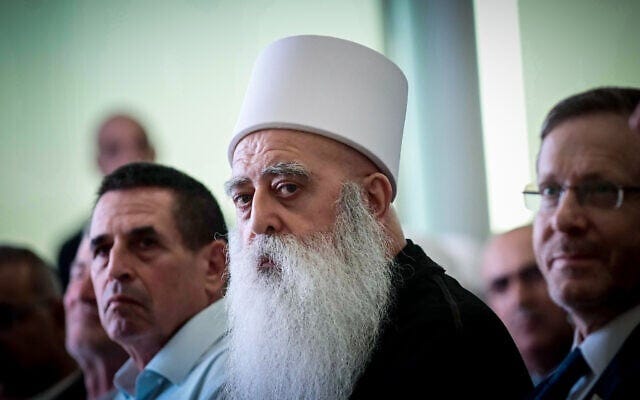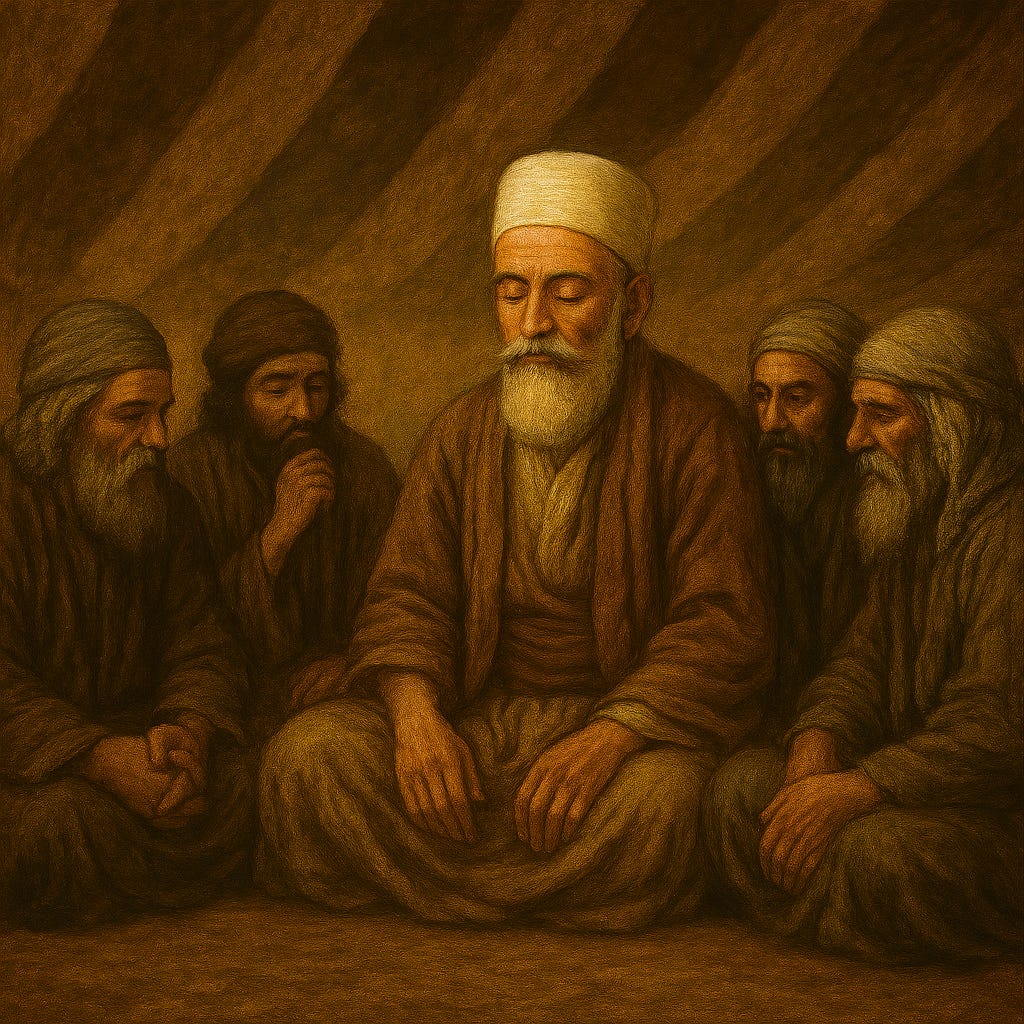Yithro and the Druze: Recognition and the Quiet Covenant
On Yithro, the Druze, and the Bonds That Endure Without Words

The Druze have been in the news again. And as always, where there is attention, there is confusion. But my relationship with their tradition isn’t shaped by headlines. It’s older, quieter, and rooted in something deeper than proximity: recognition. A year ago, I was asked to ghostwrite a letter to Shaykh Mowffaq Ṭaref, the spiritual leader of the Druze in Israel. His reply was brief, but dignified:
“The bond between the Druze community and the Jewish people is strong and unbreakable, built upon shared values and a common vision from ancient times.”
I had met him once before, in the UAE. He carried himself with a kind of warmth that felt less like diplomacy and more like distant family. That line in his letter stayed with me. It echoed something my father said once, with gravity and reverence: "We owe everything to the Druze." He meant the al-Muwaḥḥidūn (what the Druze call themselves), the monotheists, those who trace themselves to Yithro (Shuʿayb), the priest of Midian. "From him," my father said, "Moshe learned the depths of Tora and of God. We’d be nothing without them."
Truthfully, I don’t know if I believe it as a historical fact. But I hold it as something deeper, a myth that gestures toward gratitude, that orients our shared memory through Yithro. It doesn’t bind because it’s “true,” but because it honors a reality we already live.
In Perashath Yithro, the Tora portion that bears his name, Yithro shemaʿ (hears). The verb implies discernment, not curiosity. He hears "kol asher ʿasa Elohim leMoshe uleYisraʾel ʿammo" (all that God had done for Moshe and for Israel His people) (Exodus 18:1). The priest of Midian, the outsider, enters the scene not with skepticism but insight. He is honored not only with a Tora portion to his name, but with one that contains the Decalogue (Ten Commandments) themselves. Before Sinai thundered, Yithro quietly shaped the structure that would hold its revelation.
In Shemoth 18, Yithro critiques Moshe’s overwork and introduces a model of decentralized justice with minor courts and leaders. It wasn't just administrative advice, it was a philosophical corrective. A people cannot be led by the exhaustion of one individual. Authority must be distributed. The judge must never become the god.
וַיֹּ֛אמֶר חֹתֵ֥ן מֹשֶׁ֖ה אֵלָ֑יו לֹא־טוֹב֙ הַדָּבָ֔ר אֲשֶׁ֥ר אַתָּ֖ה עֹשֶֽׂה׃ נָבֹ֣ל תִּבֹּ֔ל גַּם־אַתָּ֕ה גַּם־הָעָ֥ם הַזֶּ֖ה אֲשֶׁ֣ר עִמָּ֑ךְ כִּֽי־כָבֵ֤ד מִמְּךָ֙ הַדָּבָ֔ר לֹא־תוּכַ֥ל עֲשֹׂ֖הוּ לְבַדֶּֽךָ׃ עַתָּ֞ה שְׁמַ֤ע בְּקֹלִי֙ אִיעָ֣צְךָ֔ וִיהִ֥י אֱלֹהִ֖ים עִמָּ֑ךְ הֱיֵ֧ה אַתָּ֣ה לָעָ֗ם מ֚וּל הָֽאֱלֹהִ֔ים וְהֵבֵאתָ֥ אַתָּ֛ה אֶת־הַדְּבָרִ֖ים אֶל־הָאֱלֹהִֽים׃ וְהִזְהַרְתָּ֣ה אֶתְהֶ֔ם אֶת־הַחֻקִּ֖ים וְאֶת־הַתּוֹרֹ֑ת וְהוֹדַעְתָּ֣ לָהֶ֗ם אֶת־הַדֶּ֙רֶךְ֙ יֵ֣לְכוּ בָ֔הּ וְאֶת־הַֽמַּעֲשֶׂ֖ה אֲשֶׁ֥ר יַעֲשֽׂוּן׃
“But Moses’ father-in-law said to him, ‘The thing you are doing is not right; you will surely wear yourself out, and these people as well. For the task is too heavy for you; you cannot do it alone. Now listen to me. I will give you counsel, and God be with you! You represent the people before God: you bring the disputes before God, and enjoin upon them the laws and the teachings, and make known to them the way they are to go and the practices they are to follow.’” (Shemoth 18:17–20)
In that gesture, Yithro becomes more than Moshe’s father-in-law. He becomes a founding figure in Israelite governance. Or more honestly, we become something because of him. His restraint is its own kind of wisdom. Yithro recognizes the covenant without needing to claim it. He contributes to revelation without entering it. And yet, he does not stay. Yithro arrives in chapter 18, but by chapter 19, before Sinai, he departs. He is not part of the covenant. He offers qorban (a meal to bring one closer to God's reverence), eats with the Israelite High Priest, Aharon, and the elders, even invokes Elohim (God, in malakhim/judgement). But he does not cross the boundary God draws at the mountain. He knows where to stand.
The Druze remember him as Shuʿayb. Jewish tradition remembers him by many names: Reʿuʾel, Yether, Ḥoḇaḇ, Puṭiʿel, Qeini, Ḥeḇer, each reflecting a different aspect of his legacy (Mekhiltha deRabbi Yishmaʾel, ʿAmaleq 3:4). In Judaism, names are not just labels but interpretations. They signify relationship, action, perception:
Reʿuʾel | רְעוּאֵל (Exodus 2:18) - "Because he was, as if, a friend to God" (Friend of God).
Yithro | יִתְֿרוֹ (Exodus 3:1) - "Because he became outstanding in good deeds" (His Excellence).
Yether | יֶתֶֿר (Exodus 4:18) - "Because he added a section to the Tora" (Addition).
Puṭiʾel | פּוּטִיאֵל (Exodus 6:25) - "Because he abandoned idolatry" (God is my deliverance).
Ḥoḇaḇ | ֿחֹבָֿב (Numbers 10:29) - "For being beloved by God" (Beloved).
Qenee | קֵנִי (Judges 1:16) - "Because he was zealous for Tora and acquired Tora" (Smith/Zealous/Acquired).
Ḥeḇer | חֶבֶֿר (Judges 4:11) - "Because he became a companion to God" (Associate/Companion).
These aren’t aliases. They’re prisms. Each name encodes how he was seen and what he gave. The Druze describe Shuʿayb as "he who branched toward the right path," a guide, a revealer, a foundation layer.
My family lived for generations in Deir el-Qamar, the historic capital of Mount Lebanon. It was there, in the early 17th century, that the Druze Emir Fakhr ad-Din II articulated a political vision that mirrored Yithro's wisdom, a plural society sustained not by conquest but by cohesion. Under his rule, Jews, Christians, and Muslims were not merely tolerated, they were respected. In 1638, the Deir el-Qamar synagogue was built, an emblem of that trust. My ancestors' home was attached to that synagogue and we prayed there before moving to Beirut in the 1840s, joining a growing Jewish community that included refugees from Iraq, Syria, and beyond.
Relations with the Druze, especially in the Chouf, were marked by quiet loyalty and mutual recognition. In a region often fractured by majoritarian politics, this was something rare: a relationship grounded in boundary and dignity, not assimilation. Like Yithro, Fakhr ad-Din understood that unity required limits. That identity could be honored without being dissolved. And perhaps that is why this legacy, however buried under war and time, still lingers. Not as nostalgia, but as proof that shared survival, rooted in mutual reverence, is itself a kind of covenant.
That legacy is not political. It is not an alliance of convenience. It is a shared ethic of boundaries and memory. A bond of small peoples who never tried to dominate history, only to survive it with integrity. That, too, is covenantal.
The Druze do not proselytize. Their doors are closed. Their texts, sealed. But in every encounter I’ve had, whether with Shaykh Ṭaref or with a quiet village elder, I’ve sensed the same thing: recognition. Like distant cousins who no longer speak the same language, but still recognize the face.
Maybe that’s what a covenant looks like when it isn’t written. Gratitude.
And maybe that’s Yithro’s greatest legacy.



